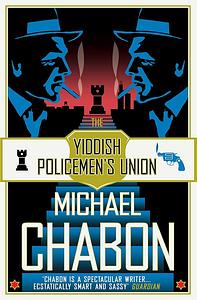Take a photo of a barcode or cover
funny
slow-paced
Plot or Character Driven:
Character
Strong character development:
Complicated
Loveable characters:
No
Diverse cast of characters:
No
Flaws of characters a main focus:
Yes
The Yiddish Policemen’s Union by Michael Chabon handily won the Hugo Award for Best Novel in 2008. As an alternate history, it gets lumped in with science fiction and fantasy, although there is a quasi-fantasy element that surfaces in the latter part of the book. As one would expect from a Pulitzer Prize winner, Chabon is an excellent writer who knows how to evoke mood and emotion. The story is a detective noir (more along the lines of Chinatown than The Maltese Falcon) set in Sitka, Alaska, where the Jews settled in 1948 and are now, sixty years later, in danger of being expelled when the land reverts to Alaskan control. Homicide detective Meyer Landsman begins what looks like a fairly routine murder investigation only to be drawn into a circle of intrigue, deception, and conspiracy. Along the way he must face his personal demons in the forms of his estranged wife, who is now his boss, and the mysteries of his sister’s death in an airplane accident years ago. Weaving colorful characters and settings together, Chabon paints a fascinating picture of what might have been, while keeping us enthralled with mystery and action. Chabon’s use of Yiddish, Yiddish-derivatives, and even Esperanto words and phrases may turn off some readers, but most of the words are contextually self-evident, and there is a glossary in the back of the book. The Yiddish Policemen’s Union is a marvelous feat of world building and linguistics.
As an alternate history, The Yiddish Policemen’s Union gets lumped in with science fiction and fantasy, although there is a quasi-fantasy element that surfaces in the latter part of the book. As one would expect from a Pulitzer Prize winner, Chabon is an excellent writer who knows how to evoke mood and emotion. The story is a detective noir (more along the lines of Chinatown than The Maltese Falcon) set in Sitka, Alaska, where the Jews settled in 1948 and are now, sixty years later, in danger of being expelled when the land reverts to Alaskan control. Homicide detective Meyer Landsman begins what looks like a fairly routine murder investigation only to be drawn into a circle of intrigue, deception, and conspiracy. Along the way he must face his personal demons in the forms of his estranged wife, who is now his boss, and the mysteries of his sister’s death in an airplane accident years ago. Weaving colorful characters and settings together, Chabon paints a fascinating picture of what might have been, while keeping us enthralled with mystery and action. Chabon’s use of Yiddish, Yiddish-derivatives, and even Esperanto words and phrases may turn off some readers, but most of the words are contextually self-evident, and there is a glossary in the back of the book. The Yiddish Policemen’s Union is a marvelous feat of world building and linguistics.
Quirky and hilarious. I was totally absorbed in this world.
slow at some bits, sort of confusing at others, but the writing made it all worth it
Held up well to re-reading. I don't think I caught the first time how tongue-in-cheek Chabon is about the whole hardboiled detective thing. The dialogue was fun and the story still held my attention. Lots of odd little jokes in passing, and bigger inversions (the big reveal is a kind of jab at the long history of Jewish-conspiracy nonsense).
Immersive sense of place, interesting characters (how hard is it to do the hard-boiled detective in a way anyone gives two cents about?), and an alternate history backstory that's relevant to the plot. Would recommend to anyone who likes character-driven sci fi and fantasy and can tolerate a police procedural, or vice versa -- or enjoys both.
Immersive sense of place, interesting characters (how hard is it to do the hard-boiled detective in a way anyone gives two cents about?), and an alternate history backstory that's relevant to the plot. Would recommend to anyone who likes character-driven sci fi and fantasy and can tolerate a police procedural, or vice versa -- or enjoys both.
I'm in complete awe of Chabon's command of language, truly.
It is hard for me to imagine that anyone who appreciates good fiction can dislike this novel, although there are plenty of negative reviews. Brimming with creativity, Chabon takes the basic template of a noir detective novel but places it in alternate reality, where Jews have populated an area of Alaska post WWII. The story deals with exile, murder, family, love, divorce, religion, substance abuse, chess, oh, and a possible Messiah. The characters are richly developed, the prose is wonderfully written, and the dialogue is simply fantastic. My advice is to begin with the Yiddish glossary at the end of the book, then read at least the first 40-50 pages before stopping to get into it. The rest will be delicious.
I kind of feel bad for only giving this book three stars. I can't deny that it was well-written, however I never quite connected with it. The whole time I was reading it, I never fell into it. I was always checking how many more pages I had to get through before I could start a new book. Perhaps this is because it was almost entirely populated by male characters. There were two women in the book -- one who was only briefly seen in flashbacks and one who existed totally through the eyes and experience of her ex-husband. Maybe I don't feel so bad about giving it only three stars after all. I have a world of respect for Michael Chabon, so I'll just chalk this one up to "not for me".
I really thought I had a decent amount of yiddish in my vocab, especially for an Irish-ish girl from Wisconsin. This book proved I have far to go...




